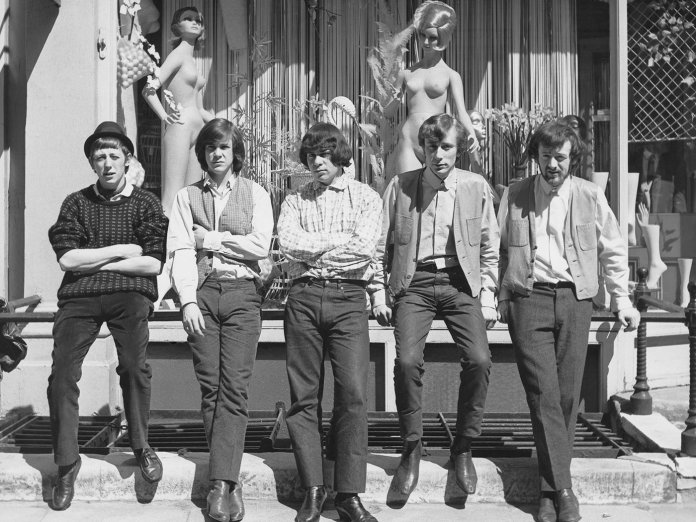Dick Taylor, Pretty Things founder on the story of their music, “We wanted to put our own mark on things” in our MAY 2023 issue of Uncut, available to buy here.
How would you summarise The Pretty Things in 1964?
We were an R&B band that wanted to be popular but didn’t want to be a pop group. We wanted to be a bit different and true to our artistic principles. We had ambition and incompetence. What we didn’t want to do, and Phil was very hot on this, was to try and reproduce somebody else’s work. We wanted to do Bo Diddley songs but in our own way, which was rough and ready. We wanted to put our own mark on things.
When did you and Phil start writing together?
It took a while for the partnership to develop. “Rosalyn” was by Jimmy Duncan, one of our managers with Bryan Morrison. We should have got an arrangement royalty because we did totally transform it. Then we had “Don’t Bring Me Down” by John Dee. Then I wrote “Honey, I Need” and that’s when Phil started to join me in writing. Some of the songs, I did a verse and then Phil would come and add other verses. Melodically, when it came to the vocal line he always had significant input. It was proper collaboration. Bowie covered the first two singles for Pin Ups. Bowie was our first fan. He used to follow us quite a lot, this weird skinny guy. We got no royalties from Pin Ups but it was very cool and helped people find out about us.
How did you evolve?
With Emotions, Phil had the concept of a concept album about emotions, but it wasn’t as fully formed as SF Sorrow. Phil came to really dislike Emotions because of the brass arrangements, which weren’t exactly Memphis. I have grown to like it, but Phil felt it was a transitional thing until we eventually got to SF Sorrow. The idea was to do longer themed albums. We’d listen to stuff like A Love Supreme, which had one track on an entire side, and want to do something similar. It’s wonderful that SF Sorrow is still around. People are always coming to us saying it was hugely influential. One of the reasons I left the band at that point was I felt we had done something I was really proud of.
Were you evolving too fast for the audience?
Everywhere we went, the audience was different. We’d go to Newcastle and the crowd was still screaming girls. We’d play the Ricky-Tick in Windsor and it was very sophisticated. We used to play Harlow to a Mod audience then we were somewhere up north and a guy with a leather jacket said very earnestly “You’d never play to those mods, would you?” In London, we played to the hippie crowd at UFO, Middle Earth or the Roundhouse.
Did you stay in touch after you left the band?
I remained pretty close. I mixed them at live shows for a while. Throughout that era, Phil was always trying new things. Sometimes it was difficult for him. In the Swan Song era when they went off to America and had Peter Grant behind them, Phil kind of had what he wanted and realised it wasn’t what he wanted after all. I’m not sure we wanted the level of success of somebody like the Stones – I don’t think I wanted that, or Phil either.
Tell me about Cross Talk, which is very different again to what came before?
I had been to see The Clash a few times and it was very exciting. Phil had a thing about The Police and he also loved The Pretenders and Tom Petty. But hopefully Cross Talk doesn’t sound like we were just copying New Wave and there’s a bit of character of our own. The day before Cross Talk was due to come out, there was a big exposé on World In Action about how Warner Bros were paying to get records into the charts. That meant there was no promotion for the record. The other thing they did was press the same side twice, which went out to reviewers. As compensation, Phil was sent a huge cheese. “Sorry, we fucked your career, here’s a big cheese…” After Cross Talk, we continued in various guises until we met Mark St John, our manager who managed to sort out our rights. That’s the reason we can do this box. All these things were on different labels and now they’re here in one big box.
Why did you go back to the studio in 1999?
We wanted to make good music again. It was really nice to be back in a studio. The Sweet Pretty Things… came from a line in “Tombstone Blues”, which I am sure was a nod to us. Bob Dylan was very friendly with Brian Pendleton our rhythm guitarist. One time I was in Blaises and Dana Gillespie came up and said Bob wanted to know if Brian was around. I thought I was going to be invited to join their table but he only wanted Brian. But we did all get invited to a show Dylan did at the BBC.
In a way it was quite a lovely experience. I’d pick Phil up from the station and drive to the studio and we’d chat. Just the two of us. Phil had started showing signs of being unwell around four years before the album. We were in Spain and had to leave him in hospital – I thought it might be the last time I’d see him. So that album and the final show at the Indigo were a bonus. It made that last album very moving. We were back doing blues and it was a fitting epitaph.



